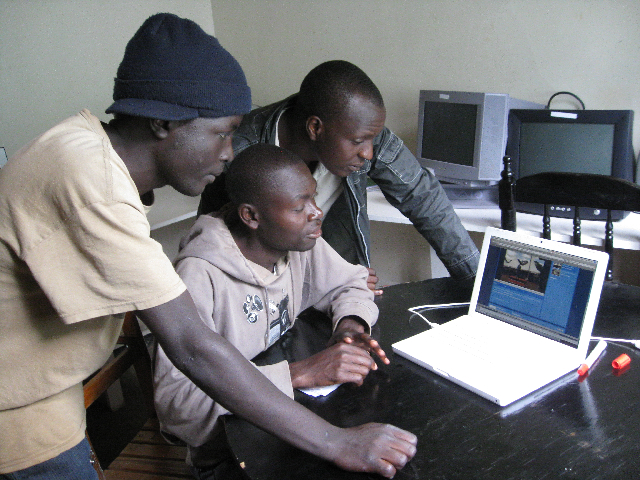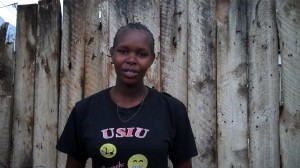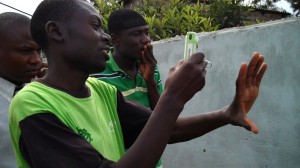Something pretty amazing is happening in the dusty concrete rooms of our partner, KCODA.
It’s been about three months since we started working with 17 Kibera youth on the Kibera News Network (KNN) – an online “TV channel†for local stories and news about Kibera. They had no video experience and very little computer experience, and faced daunting challenges like lack of internet access, frequent power failures, slow computers, rampant viruses, and poor software – not to mention being nearly attacked for attempting to record subjects like a woman being beaten and looters on an overturned train. But they’ve now uploaded more than 20 short videos up on KNN’s Youtube channel, using Flip cameras and other supplies donated by UNICEF and computers at KCODA, and the new community journalists are posting more every week (or rather – giving them to me to upload, as we all wait for hallowed arrival of Safaricom wimax).
The purpose of KNN is to provide a means for Kiberans (mostly youth) to become citizen reporters of their community – sharing stories using Flip cameras and posting them online. The stories are also mapped on Voice of Kibera, and contribute to our broader goal of empowering communities to share and generate their own information. The news they report isn’t usually covered by other sources, so it’s a valuable community resource. It’s not meant necessarily to professionalize them as reporters, but to engage as many youth as possible in engaging with their community in this way – though those who enjoy it could certainly pursue journalism or videography careers.
Recently, we’ve been working on some important topics. One team reported on the recent slum upgrading in Soweto East; another on electricity disconnections. Riots have been covered alongside events promoting the draft constitution and a visit by Arsenal football coaches. A recent video on male circumcision has touched on a controversial topic and attracted a lot of views .
I’ve watched the group evolve over the past few months. We started with five teams of 3 or 4, meeting once a week. Some of them asked if they could come every day to learn as much as they could. Luckily, the KNN leaders – two young Kiberans who are already skilled in filmmaking – were happy to hang out at the KCODA office, making use of the computers and help the students edit their pieces. Steve and Jahdi are also learning how to lead and support their peers.
Rather than following a traditional training model, it’s more like a youth group – peer education and management. This sometimes means that things get a bit messy. We lock our cameras and have one of the KCODA staff, also a KNN member, sign them in and out. Any lapse in procedure can be a big problem – we had a scare when one Flip cam went missing for about a week and then “mysteriously†reappeared after prolonged debate in our weekly meeting. In order to prevent such things, I think that a sense of group identity and ownership – this is our place, these are our resources – is key. This is already happening – within each team they are keen to weed out those who aren’t “serious†and find new recruits themselves. So the group has become self-regenerating. The 17 or so we have now are not all from the original group – we’ve had to do introduction sessions for new students.
One of the most striking things about the project is that so far it’s purely voluntary, including the trainers – except for lunch on meeting day. If you know Kibera, you know that very few people do anything for free, unless it’s really important to them. The group has pushed me to spend far more time on this than I anticipated, keeping up with demand for new skills and managing this growth spurt. They do get access to the computers and cameras and training, and I think the skill building is clearly a benefit. However, in the long run, we’ll have to think more about how to help them to raise their own funds for the project. There are luckily some opportunities locally, like A24, to market clips and videos, so I think they have a chance. But I’ll have to write a whole separate post to cover the topic of paid vs. unpaid community journalism. As with OSM mapping, citizen reporting is different when you’re not wealthy. I’m just hoping to create chances for those youth with something to say, to have a chance to say it.

Working on the site at KCODA
They think it’s exciting to see their work online, but are also interested in making sure the rest of Kibera also gets to see it. On July 17th, they’ll have a local debut – showing a few clips at the start of a documentary someone else is bringing to Kibera. In the midst of all this, we’ve managed to recruit some great volunteers in both tech and journalism (though we’re still looking for a longer-term intern!).
Now, I’m interested to see how the introduction of the internet at KCODA will impact KNN. KCODA is in process of installing full-fledged computer lab, and they already let KNN use 2 computers full time. The students will be able to upload themselves, and thereby become more like the citizen reporters we’re now used to in the US. But their relationship with the internet is different – it’s not something second-nature and constantly at their fingertips, it’s a prized commodity and valuable resource. We’ll see how things evolve once this resource is more accessible.



